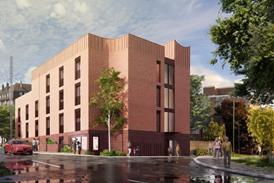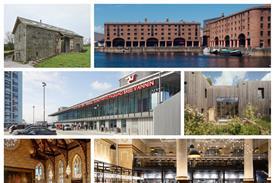Firm latest in line of MMC firms to sink into administration
Modular housebuilder Modulous will formally enter administration today after a “devastating” race to secure more funding took it to what chief executive Chris Bone described as the “end of the cash runway”.

Bone, who said the company was £4m in debt, blamed “the vagaries of the venture capital markets”. He told Building the firm had £30m of pledged funding, but when one funder pulled out and the remainder prevaricated the business “couldn’t bridge the gap”.
Modulous is the latest modular business to fail, following Ilke Homes, House by Urban Splash and last year’s closure of Legal & General’s modular arm. Bone was one of five co-founders of the 52-staff housing business which made all its staff redundant at the end of November.
Modulous consisted of a physical kit of parts that could be used to deliver multi-storey, multi-occupancy housing, and a digital design tool called TESSA - an acronym for Tech Enabled Solutions for Sustainable Architecture – which launched in October.
“We raised money [£10m of Series A venture capital] in 2022 and built a software platform [TESSA]. We launched that platform already knowing that we were getting very close to the end of the cash runway, but made a decision to launch it anyway because it would maybe help with some of the investors,” Bone said.
“We were raising a further £10m but we actually had £30m committed and then all of that was delayed until the new year. Sadly, we weren’t able to bridge the gap to the new year and that’s why we had to go through the process that we’re going through now of administration.”
The £10m Series A funding included venture capital investors including Regal London and Cemex Ventures.
Bone declined to name the funders who pulled out or delayed but described them as “household name investors within the construction market” and “the richest families in the world”.
Bone added: “We thought we were home and dry and that’s why we pushed it and pushed it.
“It looked like we had very, very sound prospects at the end of October. Then at the end of November, one [investor] pulled out and the whole thing fell apart.
“It literally happened on a Thursday night and we let the team know on the Friday afternoon [that they had lost their jobs] with immediate effect. It was devastating.”
Modulous bosses had previously described the business as nimble because it operated without a factory and “so doesn’t have a single point of failure.”
It has also previously been described by staff as a technology company as much as it is a construction firm, having secured its workforce from among former Google, Microsoft and Netflix staff.
Despite five years of work and investment, the firm’s only client for its physical kit components was Bristol County Council which had been involved in a pilot scheme to build 12 homes on Romney Avenue.
Bone reveals that the Bristol project has been another pain point for the business due to delays with finding a site. “The project is now half built. I’m not sure what’s going to happen to it but the modules are all manufactured and waiting to be at site. We would love to see that completed because we’ve made a huge commitment to the people in Bristol,” he said.
Another venture capital-backed MMC provider, Ilke Homes, collapsed last July after 15 prospective investors failed to make commitments. Bone worries there is a wider issue with using venture capital to fund innovation in housebuilding.
“What we discovered over the last two or three years is that the venture markets want to move very fast and the UK construction market doesn’t,” he said.
“It’s very difficult to satisfy venture funders with their appetite to get to revenue and grow quickly when the planning processes and all the usual inertia in the UK construction market prevents you from doing that effectively.”
He added: “If you’re going to build something new and innovative, game changing, it takes venture capital or private equity to fund that, because nobody can fund that out of profit, not even the big contractors or the big developers. So it does take a venture capital structure to fund that, but if it just doesn’t work at the same speed as the construction industry, what do we do?”
Modulous has appointed administrators Opus Restructuring and its assets are due to be sold off. Its employees are yet to discover if they will receive a redundancy payment. “It’s in the hands of our administrators now, but I really feel for everyone. We were a great group, a friendship group really, but now understandably there are some disgruntled feelings. It’s been a very torrid time,” Bone said.
















No comments yet